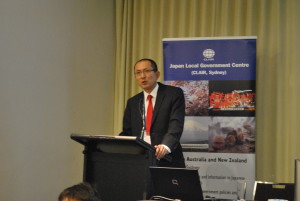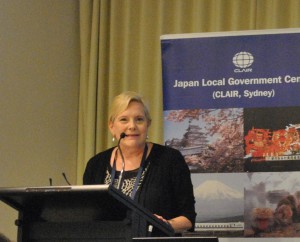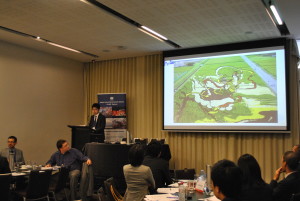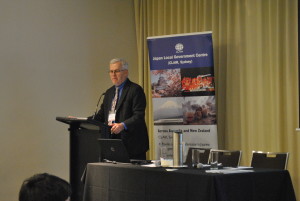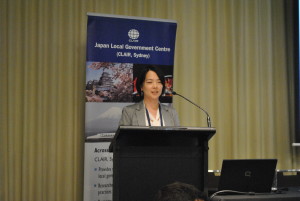2014年のCLAIR Forumの概要
2014年11月27日(木)、2014年度のクレアフォーラムを開催しました。
テーマ「地域の活性化」
会場 シドニー工科大学 (University of Technology, Sydney)
主催 クレアシドニー事務所
協力 豪州地方自治センター (Australian Centre of Excellence for Local Government)
今年のフォーラムは、豪州地方自治センターのRoberta Ryanセンター長のファシリテートのもと、北海道厚岸町と姉妹都市であるタスマニア・クラレンス市のJames Walker議員と豪州地方自治センターのAlex Gooding氏をお招きし、当事務所の所長補佐4名も加わりパネルディスカッションを行いました。
冒頭、田辺所長が開会のあいさつの中で、「日本でも地方の人口減少、都市部への人口流出が深刻な問題となっているが、特に地方の農村部は人口減少が著しい。この状態を脱却するため日本政府としても新たな取組みを行っているところである。しかし、地方公共団体も自らの戦略を練り、地方の活性化に取組んでいかなければならない」と日本が直面している課題と今後の対策について説明しました。
次にファシリテーターのRoberta Ryanセンター長からも、日本とオーストラリアの両国が抱える課題、とりわけ人口減少や一つの産業への過度な依存という問題を抱える小規模な市町村や小さなコミュニティーへの支援の必要性について述べられました。この課題への対策として、具体的かつ実効的な事例が発表されることを期待し、皆さんで討論していきたいと述べられ、パネルディスカッションが始められました。
パネルディスカッションは、「地域の活性化」というテーマを柱に、「地方の魅力ある特産物と観光の情報発信」という商業的な戦略と「地方に人を惹きつける」という長中期的な戦略の2つの視点から3名ずつが発表しました。
「地方の魅力ある特産物と観光の情報発信」
ここでは、James Walker氏、清野所長補佐、芝所長補佐の3名による発表が行われました。 James Walker氏からは、クラレンス市の活性化戦略について、お話いただきました。市の海岸部に焦点を当て、ビジネスの場として売り込むために環境整備を 行っていることや、近隣都市と協力をして観光に力を入れていることなどについて紹介がありました。また、新たな取組みとして、短期滞在型で農業体験ができる施設を構想しており、農業自体を観光資源と捉え、訪れた人にその土地の特産物を手にしてもらい、販売促進に繋げていこうとしている事例が紹介されました。
清野所長補佐、芝所長補佐からは、日本では、地域の強みを引き出し、住民一丸となって取組んでいる観光イベントの事例や、自治体が地域の特産物を売り出す ため積極的な取組みを行っていることが紹介されました。特に青森県で行われている田んぼアートの紹介は、参加者の目を釘付けにしていました。
3名の発表に共通していることは、効果的に地域の魅力を伝えるためには、何が強みなのかを考え、積極的に自治体も取組んで行く必要があるということ。一方、参加者からは、今回の取組事例について、オーストラリアではどのような応用が可能かといった質問や、姉妹都市と経済交流をしていくことも地方の活力を高めていく上で有益ではないか、といった提案がなされました。 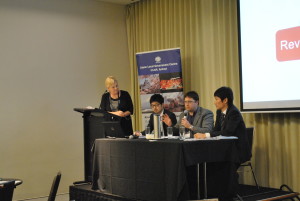
「地方に人を惹きつける」
ここでは、Alex Gooding氏、平澤所長補佐、迫田所長補佐の3名による発表が行われました。
Alex Gooding氏からは、持続的に経済成長を保っている5つの地方都市に焦点を当てて行った研究について述べられました。この研究により、経済成長を持続している都市では、その地域における文化やそこに暮らす人々を貴重な資源だと捉えているという共通点があると発表されました。そして、経済成長の成功の鍵は、組織構造にあると述べられました。一人のリーダーではなく、分野ごとにリーダーとしての役割を与え、組織内の人材を最大限活用するという共有型リーダーシップの必要性、地方の公的機関への権限移譲の必要性などを強調されました。
平澤所長補佐、迫田所長補佐からは、その土地ならではの人を惹きつけるための取組みが紹介されました。 今、日本では人口減少による住宅の空き家が社会問題となっていますが、これを逆手に取り、空き家を活用した移住体験や女性向けの農業研修事業を実施している事例が発表されました。また、その地域の主要な自動車産業により培われたものづくりの技術が福祉の分野で活用されている事例や、持続的・効率的な農業の実現に向け集落法人化を推進する事例、家畜のふん尿等を原料としたバイオガスを使った新たなビジネスを構築した事例など分かりやすいスライドにより紹介されました。 両所長補佐は、その地域に人を呼び込むためには、様々な分野での発想の転換が必要であることを強調していました。
参加者からは、地方公共団体の長によって、戦略は変ってくるのではないかといった質問も出るなど、活発な意見交換が行われました。 今回も、フォーラムを通して両国が抱える課題や両者にとって参考となる事例についてお互いに学ぶ貴重な機会となりました。このフォーラムの開催に向け協力してくださった豪州地方自治センターに心から感謝するとともに、一層緊密な関係を築き、両国の地方自治の発展に貢献していきたいと考えているところです。


